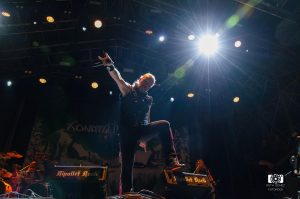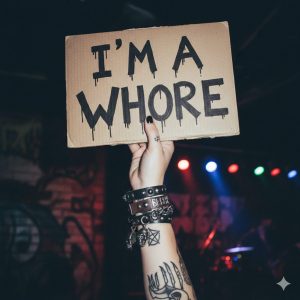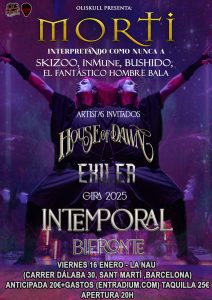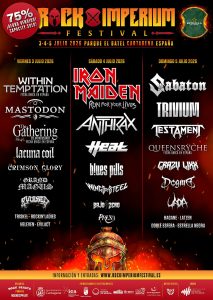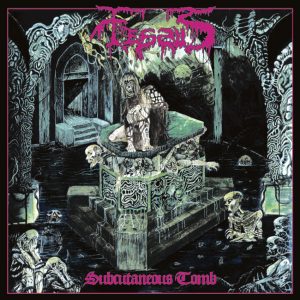IMMORTAL BIRD: Pushing Boundaries, Confronting Injustice

In this powerful interview, Rae of Immortal Bird dives into the evolution of their sound on Sin Querencia, highlighting the collaborative process and genre-blurring experimentation. But beyond the music, Rae takes a strong stance on critical socio-political issues, particularly condemning Zionism and speaking out against the ongoing genocide and oppression of the Palestinian people. With fierce support for Palestinian freedom, Rae critiques hypocrisy, complicity, and global injustice, emphasizing the role of extreme music in challenging societal norms and confronting deep-seated systems of oppression.
Artistic Evolution and Album Specifics
With «Thrive on Neglect,» you established a complex, multi-layered sound. How does «Sin Querencia» expand on this foundation, and what new elements did you incorporate to push the boundaries of your previous work?
We’ve improved as musicians and songwriters over the last five years, and this writing process was very collaborative. We were more experimental this time and focused on including elements we felt were underutilized on “Thrive on Neglect” especially in the vocal and synth realm.
«Sin Querencia» sees a departure from genre constraints and includes a mix of Death and Black Metal, Hardcore, and Noise Rock. Can you delve into how these diverse influences are blended in the album? How do you ensure coherence in such a multi-faceted sonic landscape?
We’ve always blended genres and listened to a lot of different music. It’s all very subjective, so some people might hear something and swear they hear a certain influence when that may be something unfamiliar to us. Cohesion is subjective, too. What might sound seamless and blended to one person might seem frenetic and senseless to another.
The recording process for «Sin Querencia» involved a tighter three-piece lineup with Nate Madden handling most of the bass work. How did this change in dynamics influence the album’s sound and your approach to songwriting and production?
When we came together to write, it was more of a collaborative writing process than anything we’ve previously done. We had parted ways with our longtime bassist and were kind of a three-piece unit for almost a year going into the recording. Nate (our guitarist) played the majority of the bass on the album, but we all contributed bass performances. While we were writing, sometimes Matt (Korajczyk, drummer) and I would play along with Nate on drum sets next to each other. The approach overall was very free, and thoughtful.
The album features a significant range of vocal styles, from the raw aggression to more haunting clean vocals. How did you decide on the balance and placement of these different vocal approaches to best serve the thematic elements of the album?
I was hearing the clean melody in “Bioluminescent Toxins” for a while before we recorded but I wasn’t sure if it would be delivered vocally or via another instrument. I eventually decided to sing during that part, because I thought it would be an interesting choice, and an opportunity to express lyrics differently.
Social and Philosophical Discourse
«Sin Querencia» confronts themes of hypocrisy and complicity in contemporary society. How do these themes resonate with the current socio-political climate? Are there specific instances or societal issues that directly inspired these lyrical explorations?
Hypocrisy and complicity are timeless, and I do try to speak about those concepts in a broad sense. However, the continued genocide and oppression of the Palestinian people and vaunting brutality of the Zionist state is an unavoidable influence on the entire record. I was also inspired by “good” people with selectively applied and watered-down morals, especially when it comes to police. The first A in ACAB stands for All, even if it’s the singer of a band you like, or your dad, or your buddy from high school. How does anyone need to say this in 2024? When you’re easy to manipulate and have shallow interests, it’s easy to become a shill. I also understand that it’s all deeply connected. The fascism, cronyism, and degradation of ethics across the globe just creates a better environment for the colonial horde.
Your music often addresses deep and visceral subjects. In light of the album’s critique of complacency and societal flaws, how do you see the role of art and music in challenging or confronting these issues? Do you believe that extreme music has a unique capacity for social commentary?
I think extreme music has the capacity for more extreme commentary in certain ways, whether that be through visceral lyrics or subversive artwork or the technical delivery (i.e. blast beats and screaming). Art has always been implemented to challenge and confront difficult subjects and adversaries, and I think music in general has a unique capacity for social commentary.
The concept of «Querencia,» implying a safe haven, is contrasted with the album’s themes of absence and turmoil. How do you think this juxtaposition reflects on societal perceptions of safety and security in today’s world? Do you see a parallel between the personal and collective sense of insecurity?
I think the personally and societally inflicted insecurities of men are the main reason why so many people are currently and collectively unsafe in today’s world.
With the increased focus on mental health and societal critique in music, how do you think «Sin Querencia» contributes to these discussions? Do you view your music as a means of fostering dialogue or raising awareness about broader issues?
I haven’t really noticed an increased focus on mental health in music. I think maybe I just assume that most people creating this type of music have some kind of depression, anxiety, PTSD, or neurodivergence that is fueling or influencing their creative output. I’m not sure how Sin Querencia contributes to these discussions because the album hasn’t come out yet, and so these conversations are strictly hypothetical for now.
Personal and Creative Insights
The album features a diverse array of musical techniques and structures, reminiscent of boundary-pushing bands like Gorguts and Ulcerate. How did you approach integrating these complex elements while maintaining clarity and cohesion in the music?
We’re lifelong musicians writing music together in a very deliberate way. We don’t necessarily think about integrating “complex” elements in and of themselves. All of the dynamics are meant to come across organically, and that is extremely intentional. What might be clear and concise to us might be a complete mess to someone else and that’s just a risk that comes with being a more “extreme” band in this genre, or really any style where there’s experimentation or deviation from an expectation.
Looking at the cover art by Kikyz1313 and the production by Pete Grossmann, how do you feel these elements complement and enhance the themes and sound of «Sin Querencia»? What was the vision behind these collaborative choices?
We’ve used artwork by Kikyz1313 for all of our releases and when I saw ‘what makes us human’ (2016) I immediately knew it was the cover for Sin Querencia. It’s disturbing and deeply disheartening. This record took a long time to write, and we had a lot of goals that we set out to check off before we felt like the record was done. There were a lot of advantages to doing it with Pete at home in Chicago. We’ve all worked with him before and trust him. He is incredibly dependable, very passionate, super professional, and kind. We knew he would support our choices while also thoughtfully coming up with ways to improve upon them.
Future Directions and Reflection
As you approach the release of «Sin Querencia,» how do you envision its impact on your fan base and the broader metal community? Are there specific reactions or discussions you hope to inspire with this album?
I think fans of our previous work will connect with this music, and hopefully we find a new audience as well. Positive reactions and discussions would be ideal.
Reflecting on your decade-long journey as a band, how have your perspectives on metal music and its potential for social commentary evolved? What lessons or insights from «Sin Querencia» do you hope to carry into future projects?
My perspective is that metal music has great potential for social commentary but a lot of the people who have control over amplifying certain voices often choose to elevate their cishet white male peers and are very careless with their tokenization and “inclusion” of other identities. I’m going to keep making music despite having too much “insight” into the industry because deriving one’s artistic merit from commercial metrics is a fool’s errand.
How do you balance the intense, often niche themes in your music with the desire to reach a wider audience? Do you see your focus on complex and extreme content as a strength that deepens engagement, or as a potential challenge in broadening your listener base?
We don’t think our themes are that niche, but you could say they’re approached and delivered in an intense way. That’s definitely not why we’re not reaching a wider audience. There are so many hugely successful bands that delve into way more extremes, in all aspects. I don’t think the reason we are a very small band is because of extremity or complexity, two traits that are often emphasized and sought after in the metal genre. Sometimes broadening one’s listener base is as easy as the right person sending the right email to the right friend. Sometimes it takes a decade of steady touring and consistently strong recordings. Sometimes you make lateral moves. Sometimes you take steps back. All you can do is maintain some semblance of hope without entitlement.
That’s all from our side, thanks again for your time. If you’d like to add some final words, it’s your turn.



